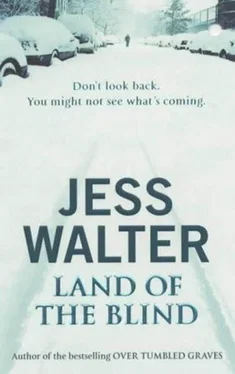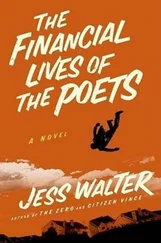Jess Walter - Land Of The Blind
Здесь есть возможность читать онлайн «Jess Walter - Land Of The Blind» весь текст электронной книги совершенно бесплатно (целиком полную версию без сокращений). В некоторых случаях можно слушать аудио, скачать через торрент в формате fb2 и присутствует краткое содержание. Жанр: Детектив, на английском языке. Описание произведения, (предисловие) а так же отзывы посетителей доступны на портале библиотеки ЛибКат.
- Название:Land Of The Blind
- Автор:
- Жанр:
- Год:неизвестен
- ISBN:нет данных
- Рейтинг книги:3 / 5. Голосов: 1
-
Избранное:Добавить в избранное
- Отзывы:
-
Ваша оценка:
- 60
- 1
- 2
- 3
- 4
- 5
Land Of The Blind: краткое содержание, описание и аннотация
Предлагаем к чтению аннотацию, описание, краткое содержание или предисловие (зависит от того, что написал сам автор книги «Land Of The Blind»). Если вы не нашли необходимую информацию о книге — напишите в комментариях, мы постараемся отыскать её.
Land Of The Blind — читать онлайн бесплатно полную книгу (весь текст) целиком
Ниже представлен текст книги, разбитый по страницам. Система сохранения места последней прочитанной страницы, позволяет с удобством читать онлайн бесплатно книгу «Land Of The Blind», без необходимости каждый раз заново искать на чём Вы остановились. Поставьте закладку, и сможете в любой момент перейти на страницу, на которой закончили чтение.
Интервал:
Закладка:
But it happens anyway.
A week after I left, Ben's boss called my mother to say that he had missed two straight days of mopping. Mom found him unconscious on the floor of his apartment, in his pajamas, a spilled mug of wine on the linoleum. He was sweating and feverish, his neck and shoulders horribly swollen. She had seen his glands do similar, smaller versions of this trick over the last two years, and she thought about the years of chills and sleeping problems – That boy's always got a bug. She said his name and touched his forehead, and her hand jerked away, hot and wet.
I don't know whether, in those first days, my parents shielded the severity of Ben's illness from me, or the doctors shielded it from them, or I simply didn't get it. But from across the state, the progression was impossibly fast, marked by confusing telephonic pronouncements from my mother: The doctors think it's The Exhaustion. They're testing him for The Cancer. They think it's in The Limp Nose. They think it might be The Hotchkiss Disease. Apparently, it's matzo-sized, which sounds fairly big. They think it's in the fourth stage. I think that means he's almost better.
I don't blame my mother for any of this. She'd suddenly been dropped onto a planet with a completely different language, and doctors who couched my brother's death sentence with passive and misleading terms ( late-term systemic, marginal outcome, radical treatment, negligible recovery rate), terms that forced her to ask questions she didn't even know the words for and certainly didn't want the answers to. And she had to bear this alone. My father couldn't bring himself to step into a hospital, and my sisters were too young to help. I planned to come home when the quarter ended, of course, but I was too late.
Afterward, the doctors said that Ben's body had rejected the experimental drugs. But they insisted that the drugs had been his only chance. He was lucky, they said, because he wasn't lucid at the end and had very little idea what hit him. I have a tough time thinking of Ben as lucky, of all things. Ben had a mathematician's sense of the world. He was fascinated by probability, interested in the play of numbers against events. "What are the odds," Ben was always saying, although like most people interested in defining luck, he seemed to have very little of it himself. Growing up, he would gamble on anything: ball games and stock prices and elections and how many kids were in the new neighbor family, whether it would rain tomorrow. He loved stories of rare and marvelous fortune: the lottery winners and people who find free money, the man who falls from an airplane and lives, the woman who finds a Van Gogh in the attic. "What are the odds," he'd say, and this wasn't just a figure of speech for Ben; he genuinely wanted to know. "One in a million?" I'd say. "Three million," he'd say; the longer the odds, the deeper Ben's interest. I think he would've been morbidly fascinated to find out that his kind of blood cancer had an occurrence rate of less than one in two hundred thousand, that 80 percent of Hodgkin's sufferers can be cured, but that the percentage with Ben's combination of factors who had a sustained remission was so small as to be – as the doctors liked to say – negligible. Of course, Ben wouldn't have settled for a sloppy word like "negligible." Ben believed there was a number that corresponded with everything in the universe and everything in people – not just our height but our courage, not just our weight but our grief.
I had just returned from my government test when one of the guys in the frat said someone was waiting on the phone for me. The phone was sitting off the hook. When I put it to my ear and said hello, there was a pause and I didn't recognize my father's voice at first. "Clark? It's Dad." He sounded rickety and unsure, as if he were speaking from a chair balanced on one leg on the ledge of a skyscraper. "Ben passed away an hour ago."
In my memory the grief is beyond description, without shape or size – my apologies to Ben – and is everywhere, filling rooms and cars and conversations. But again my sorrow is not the point of this story, and so I won't dwell on days and weeks that, frankly, I don't recall anyway, aside from the keening of my mother and the way my father's hands hung at his sides; he was not a man accustomed to helplessness. The funeral was – as funerals for young people always are – unbearably sad, and made maudlin by some of Ben's old high school friends, who stood to blow their noses in front of the congregation and offer that Ben was "like, cool." I remember wishing I could make eye contact with him then so we could revel in their idiocy and in the silliness of such a spectacle. Ben would've liked it.
In fact, Ben would've relished everything about his funeral – the melodramatic grandeur and hypocrisy, the way slim acquaintances treated their sadness as a kind of commodity, the way they invented relationships with the deceased and tortured us with empty memories and platitudes. I imagined how Ben would've loved watching people sidle up to me after the service to recap for me what had happened.
"So sudden," they said, shaking their heads.
"Yes."
"Your only brother," they said, apparently thinking that hadn't occurred to me.
"Mmm."
"And for you, to not make it home from college."
"Yes."
"The fact that you never even got to speak to him."
"Right."
"You must be devastated."
"Mmm."
And then, shuffling their feet, summing up: "And someone so young."
"Yes," I said. "What are the odds?"
After the funeral I spent the night at my parents' house, but it was dark and ghostly and I knew I had to leave. The next day I drove back to Seattle with the radio off and the windows down, icy air blowing through the car. I stopped at the tiny town of Vantage, at the crossing of the Columbia River, got a cup of coffee, and stood on the banks watching the black mass carve a path to the ocean. Where I'm from, everything flows east to west. So that's what I did. I kept driving, until I dropped down out of the Cascades and into the Puget Sound clouds.
All that week the weather sat heavy on Seattle, gusting rain and acres of wet fog. I slept in my car the first night rather than returning to the fraternity house. The next day, I checked into a motel and I sat there all weekend. I ate only potato chips and drank only water. Then, on Monday, the sky suddenly cleared and the mountains emerged from fog and the brick and ivy of the university seemed almost too sharp, too focused.
I knew I had to get back to my life, and so late that morning I walked to my first class in a week, the sun on my neck and shoulders pushing me on. I slumped down in a chair in my Principles of Government class. After a few minutes the other students began filing in; the professor came over, arms crossed on his chest like sagging bandoliers.
"Mr. Mason?" he said. "You missed a few days."
"Yes," I said. It seemed like enough.
He nodded. "Well, we're still on the Greeks." His name was Richard Stanton – a former lawyer, weekend television anchor, public relations man, and state legislator. He would also become my mentor, my campaign manager, my best friend.
Professor Stanton was in his late forties, silver haired and handsome to the girls in class, although his deep-clefted chin drew him the nickname Dr. Assface. He was one of those men discomfited by age; he'd gone in for a small stud earring and had recently begun keeping his neat gray hair a few inches past professional. Each morning he gathered the back, which was short of his collar, and tied it in a desperate ponytail, and although there couldn't have been a half-inch of hair on the south end of the rubber band, I think it was meaningful for Dr. Assface to have that ponytail.
Читать дальшеИнтервал:
Закладка:
Похожие книги на «Land Of The Blind»
Представляем Вашему вниманию похожие книги на «Land Of The Blind» списком для выбора. Мы отобрали схожую по названию и смыслу литературу в надежде предоставить читателям больше вариантов отыскать новые, интересные, ещё непрочитанные произведения.
Обсуждение, отзывы о книге «Land Of The Blind» и просто собственные мнения читателей. Оставьте ваши комментарии, напишите, что Вы думаете о произведении, его смысле или главных героях. Укажите что конкретно понравилось, а что нет, и почему Вы так считаете.











